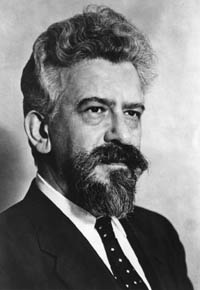Źródło: Anna Wojnar, Żydzi i judaizm we współczesnych badaniach, „Alma Mater”, nr 90, marzec 2007, s. 49.
Abraham Joshua Heschel cytaty
Abraham Joshua Heschel: Cytaty po angielsku
“There is a glory, an aura, that lies about all beings, a spiritual setting of reality.”
Źródło: Who Is Man? (1965), Ch. 5<!-- The sense of the ineffable, p. 90 -->
Kontekst: In English the phrase that a person has "a presence" is hard to define. There are people whose being here and now is felt, even though they do not display themselves in action and speech. They have a "presence." … Of a person whose outwardness communicates something of his indwelling power or greatness, whose soul is radiant and conveys itself without words, we say he has presence.
Standing face to face with the world, we often sense a presence which surpasses our ability to comprehend. The world is too much with us. It is crammed with marvel. There is a glory, an aura, that lies about all beings, a spiritual setting of reality.
To the religious man it is as if things stood with their backs to him, their faces turned to God, as if the glory of things consisted in their being an object of divine care.
"The Holy Dimension", p. 337
Moral Grandeur and Spiritual Audacity: Essays (1997)
"The Holy Dimension", p. 335 - 336
Moral Grandeur and Spiritual Audacity: Essays (1997)
Kontekst: There are many creeds but only one faith. Creeds may change, develop, and grow flat, while the substance of faith remains the same in all ages. The overgrowth of creed may bring about the disintegration of that substance. The proper relation is a minimum of creed and a maximum of faith.
Źródło: Who Is Man? (1965), Ch. 4<!-- p. 79 -->
Kontekst: Wonder, or radical amazement, is a way of going beyond what is given in thing and thought, refusing to take anything for granted, to regard anything as final. It is our honest response to the grandeur and mystery of reality our confrontation with that which transcends the given.
Źródło: Who Is Man? (1965), Ch. 5<!-- The sense of the ineffable, p. 88 -->
Kontekst: The world presents itself in two ways to me. The world as a thing I own, the world as a mystery I face. What I own is a trifle, what I face is sublime. I am careful not to waste what I own; I must learn not to miss what I face.
We manipulate what is available on the surface of the world; we must also stand in awe before the mystery of the world. We objectify Being but we also are present at Being in wonder, in radical amazement.
All we have is a sense of awe and radical amazement in the face of a mystery that staggers our ability to sense it.
“Faith opens our hearts for the entrance of the holy.”
"The Holy Dimension", p. 339
Moral Grandeur and Spiritual Audacity: Essays (1997)
Kontekst: Faith opens our hearts for the entrance of the holy. It is almost as though God were thinking for us.
“When I was young, I admired clever people. Now that I am old, I admire kind people.”
Wariant: When I was young, I used to admire intelligent people; as I grow older, I admire kind people.
“Faith is not the clinging to a shrine but the endless, tameless pilgrimage of hearts.”
"The Holy Dimension", p. 332
Moral Grandeur and Spiritual Audacity: Essays (1997)
“Just to be is a blessing. Just to live is holy.”
"No Religion is an Island", p. 264
Moral Grandeur and Spiritual Audacity: Essays (1997)
Kontekst: Just to be is a blessing. Just to live is holy. And yet being alive is no answer to the problems of living. To be or not to be is not the question. The vital question is: how to be and how not to be?
The tendency to forget this vital question is the tragic disease of contemporary man, a disease that may prove fatal, that may end in disaster. To pray is to recollect passionately the perpetual urgency of this vital question.
"The Reasons for My Involvement in the Peace Movement" (1972) http://www.shalomctr.org/node/61; later included in Moral Grandeur and Spiritual Audacity (1996)
Kontekst: There is immense silent agony in the world, and the task of man is to be a voice for the plundered poor, to prevent the desecration of the soul and the violation of our dream of honesty.
The more deeply immersed I became in the thinking of the prophets, the more powerfully it became clear to me what the lives of the Prophets sought to convey: that morally speaking, there is no limit to the concern one must feel for the suffering of human beings, that indifference to evil is worse than evil itself, that in a free society, some are guilty, but all are responsible.
The Zookeeper's Wife (2008)
Kontekst: I have one talent, and that is the capacity to be tremendously surprised, surprised at life, at ideas. This is to me the supreme Hasidic imperative: Don't be old. Don't be stale.
Volume 1, p. 167
The Prophets (1962)
"The Holy Dimension", p. 333
Moral Grandeur and Spiritual Audacity: Essays (1997)
Źródło: Who Is Man? (1965), Ch. 4
Introduction
The Prophets (1962)
“Much of what the Bible demands can be comprised in one imperative: Remember!”
"The Holy Dimension", p. 334
Moral Grandeur and Spiritual Audacity: Essays (1997)
